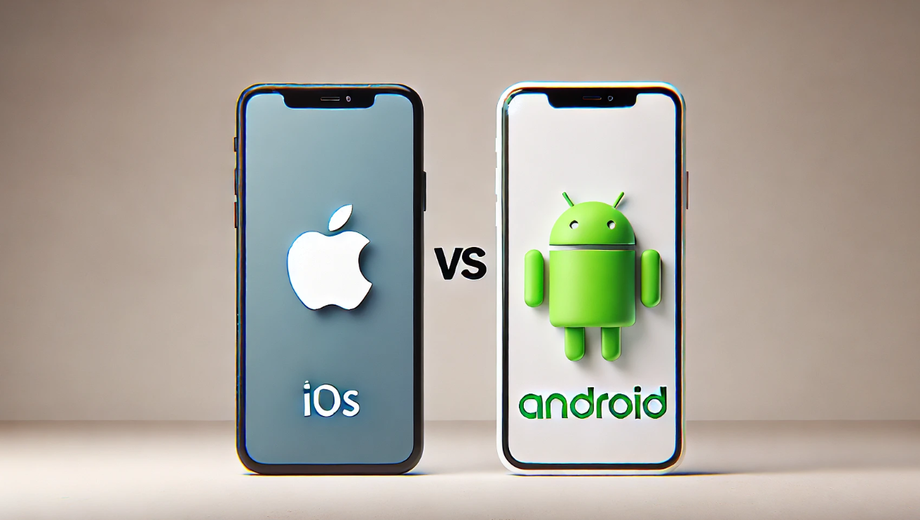Ever wondered why some apps feel smoother on iPhones than on Android phones? It’s a common observation, and it all comes down to hardware, software, and app development approaches.
Both iOS and Android have unique ecosystems, which affect how apps function on each platform. Let's explore the main reasons why some apps perform better on iPhones than on Android devices.
1. Apple’s Unified System vs. Android’s Diverse Ecosystem
One of the biggest factors affecting app performance is hardware and software integration.
-
Apple designs both iPhones and iOS, allowing apps to be fine-tuned for a limited number of devices.
-
Android operates on a wide range of phones and tablets from different manufacturers, each with varying specifications, screen sizes, and capabilities.
Because of this, developers can optimize iOS apps more efficiently, while Android apps need to be adaptable across many different models, sometimes leading to performance variations.
📌 Example: The experience of an app on an iPhone 13 and an iPhone 14 will be nearly identical. However, that same app may run differently on a high-end Samsung phone compared to a budget Android device.
2. How iOS and Android Handle Software Differently
Apple’s iOS is designed specifically for seamless performance and efficiency, while Android's flexibility leads to different levels of optimization.
-
iOS ensures consistent performance across all Apple devices by controlling software updates directly.
-
Android manufacturers modify the base operating system (such as Samsung’s One UI or Xiaomi’s MIUI), which can affect how apps behave on different devices.
Another challenge is software updates. Apple pushes updates simultaneously to all supported iPhones, ensuring most users have the latest version. In contrast, Android updates roll out based on device manufacturers’ schedules, causing delays in optimization.
📌 Example: An app designed for iOS 17 will work efficiently across all supported iPhones, while an Android app may need to accommodate multiple OS versions across various brands.
3. Development Approach: iOS vs. Android
The way apps are built also affects performance.
-
iOS apps are developed using Swift, a language optimized to run efficiently on Apple devices.
-
Android apps are written in Kotlin or Java, but since they need to function on different brands and models, developers often add extra layers of compatibility, which can slightly impact performance.
Additionally, Apple has stricter quality and performance guidelines for apps in the App Store. Google Play allows more flexibility, meaning app quality can vary more across Android devices.
📌 Example: Many gaming apps run more smoothly on iPhones because Apple enforces higher graphical performance standards.
4. How Security Measures Affect App Performance
App performance isn’t just about speed,it’s also influenced by security frameworks that protect user data.
-
Apple provides built-in security tools like Face ID and Apple Pay, ensuring faster and more seamless app experiences.
-
Android devices rely on multiple security options based on the manufacturer, which can sometimes slow down processes like mobile payments.
📌 Example: A mobile shopping app may process transactions faster on an iPhone than on an Android phone with additional security layers from the manufacturer.
5. How to Ensure High-Quality Performance on Both Platforms
If you're developing an app, here’s how to make sure it runs smoothly on both iOS and Android:
✅ Optimize for each platform individually – Avoid using the same design and functionality for both systems without adjustments.
✅ Test across multiple devices – Since Android runs on various phones, thorough testing is essential.
✅ Work with experienced developers – Mobile app development Malta team can ensure seamless performance on both platforms as they are leading ui/ux app development agency in malta.
✅ Focus on speed and responsiveness – Apps that use minimal resources tend to perform better on all devices.
6. Should Businesses Develop for iOS First?
Some businesses prioritize iOS development before launching on Android. Why?
🚀 Faster development – With fewer devices to optimize for, iOS apps are quicker to build.
📊 Higher spending habits – iPhone users typically spend more on apps and in-app purchases.
🔄 Easier app maintenance – Since most iPhones get the latest iOS version, developers can update apps more efficiently.
That said, Android holds the larger market share globally, so businesses shouldn’t ignore it. Working with an expert mobile app agency can help determine the best strategy based on target users.
Final Thoughts: Creating High-Performance Apps for iOS and Android
While iOS apps often feel smoother due to Apple's hardware and software optimizations, businesses can still build high-quality Android apps with the right development approach.
✔ Customize apps for each platform instead of applying a one-size-fits-all method.
✔ Test across multiple Android models to reduce fragmentation issues.
✔ Prioritize user experience, security, and responsiveness for better performance.
No matter which platform you start with, proper development and optimization will ensure a flawless experience for your users. 🚀

